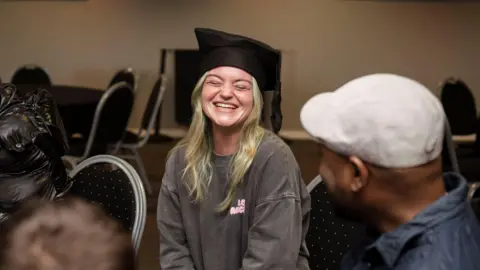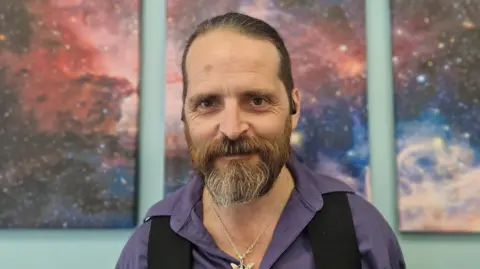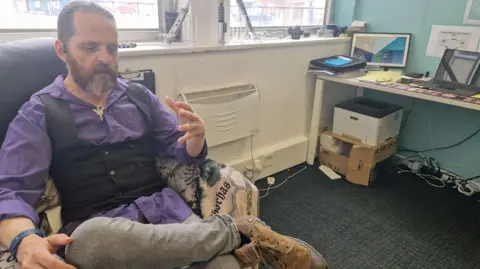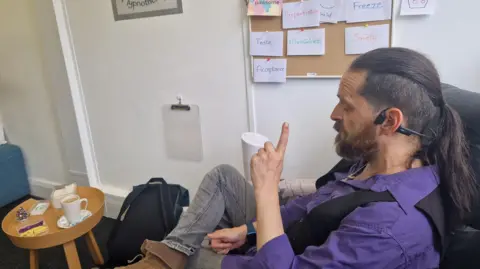 Stephanie Williams
Stephanie Williams The Wallich
The Wallich“It can happen to just anybody, a lot of us are actually only three pay checks away from being homeless ourselves… especially if you haven’t got savings behind you,” she said.
Experts have said neurodivergent people appear to have a higher risk of becoming homeless as they may have fewer friends and family they can turn to for support and find it hard to stay on top of the things they need to to keep their housing, such as bill-paying and paperwork.
Stephanie said through her life she had struggled to maintain relationships.
“I’ve lost quite a lot of people through them not understanding how I’ve meant something or if they’ve said something I’ve taken it very, very literally,” she added.
“When you’ve got autism or ADHD, a lot of the time you’re looking at how other people are in a situation, you’re mimicking but it creates this massive distance between you because you’re trying to fit into something that you’re really not understanding what it is that you’re trying to fit into.”
 Stephanie Williams
Stephanie WilliamsShe said she had never understood how other people were able to make friends and maintain friendships.
Initially after moving out of the home she had rented with her wife she was able to stay on a friend’s sofa.
After a few weeks she contacted Citizen’s Advice and was moved into a hotel that was being used to house others experiencing homeless.
She now has a permanent home in Barry, Vale of Glamorgan, is a Scout leader, volunteers with homelessness charity The Wallich and plans to start her training to become a support worker next month.
She was only recently diagnosed with ADHD and is on medication for that, she still sees a psychiatrist and is about to start psychodynamic therapy, to explore traumas she has faced in her life, including being “outed” as gay when she was growing up.
 The Wallich
The WallichRob Thomas is a private practice clinical psychotherapist and counsellor in Swansea, who works with people experiencing homelessness.
He experienced homelessness himself in his 20s, which he believes was in part down to living with childhood trauma and undiagnosed ADHD.
Rob was born with a heart condition and spent long periods of time away from his family while being treated in hospital.
“What I realise now is that I was taken away from my family and what that embedded in me was a sense of it’s just me, I’m on my own with this, so then asking for help became impossible,” he said.
Things began unravelling after he finished his degree in biomedical science in Preston – and he found he could not ask for help.
“My landlord wasn’t happy with me because I wasn’t maintaining the property to his satisfaction… I hadn’t paid council tax, I hadn’t been paying my electricity,” he said.
Missed appointments at the Job Centre meant his benefits were stopped.
 The Wallich
The Wallich“Someone who is neurotypical would encounter a problem and they’d go ‘all right I’ll make that phone call to the electricity company and sort that out’ but the level of anxiety that I would experience would be overwhelming, the idea of making that phone call I’d be getting sweats, I’d go into panic, I’d have problems sleeping,” he said.
“I would not respond to letters. I wouldn’t answer the phone.”
Rob said he found himself with nowhere to go and was forced to sleep rough, often in bus stops.
“You’re sleeping for like an hour, two hours, and then you’re awake again. You’re constantly on guard – who’s going to come asking for money? Who’s going to try taking shoes?,” he said.
After being on the streets for a few weeks his friend’s mother took him in.
“She basically dragged me by the scruff of the neck, kicking and screaming to her house,” recalled Rob.
 The Wallich
The WallichHe stayed for several months before moving back to his parents’ in Wales.
It took many years but he eventually returned to education and became a support worker for The Wallich before becoming a psychotherapist.
But even 30 years on from losing a grip on his bills he gets a rush of panic when his phone rings.
“Everybody’s expected to be the same but neurodiverse people are just people who think differently,” he said.
He added systems were only set up with neurotypical people in mind.
“If you don’t fill out the form the system doesn’t ask you ‘why didn’t you fill out the form? Is there anything we can help with?’ It’s ‘you didn’t fill out the form, you have your money stopped’ or ‘you didn’t fill out the form so we’re not giving you any more appointments’.”
Sean Stillman, who founded Zac’s Place that provides support to the homeless in Swansea, said people often make assumptions about people who are homeless but almost everyone his project supports has experienced trauma.
“When you truly try and engage with somebody’s story, you start to lift the lid, you discover that there are often multiple traumas,” he said.
“You might think someone has ended up sleeping rough or they’re homeless because they’ve got an addiction but then if you ask the question why you discover there’s so many layers, there might be broken relationships, issues of abuse, you might find that they’ve fallen out of the care system but once you get caught in a destructive pattern which involves sleeping rough, your health and mental health can quickly deteriorate, and all of a sudden you end up being somebody quite different.”
Anthony Vaughan is a trauma-informed specialist at The Wallich, which runs an in-house counselling service, the Reflections Network.
He said the people they work with who have not dealt with their trauma found it harder to move out of homelessness.
“We know that people don’t have ‘something’ wrong with them – they are people who’ve had ‘something happen to them’,” he said.
“They are survivors of trauma.”

